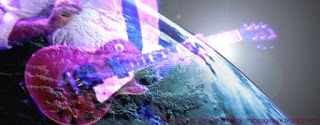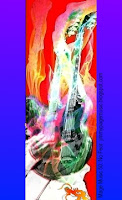~ Daniel J Levitin, This Is Your Brain on Music: The Science of a Human Obsession
Mage Music 56
This post is a mix of a few different things that at first might seem not seem connected but at a deeper level really are. I want to share some questions that have been asked here as well as on the Mage Music Facebook page, and then there's my, um, unusual playlist that I have a few things to say about.
So here we go with questions first, though not necessarily answered in the order they were asked. Sorry.
Q: What exactly is a genius? Is it true that if you can bring Magick into music you must be a kind of genius? Are all Mages geniuses? Can an artist be a non-genius and still create Magick?
A: A Kind of Magic (I got an earworm from reading the question). First, let's lay out a few basic concepts. Let's agree that a genius is a person who is exceptionally intelligent or creative. And let's agree right from the start that Jimmy Page is a musical genius since there is no doubt that he is exceptionally creative. And there's no doubt in my mind that the music of Jimmy Page carries Magick in it and probably there's no doubt in your mind either since you're reading this, so let's take that as a given, too.
But are genius and art and Magick connected?
Well… yes and no. I believe that an artist can be a non-genius and still create Magick. That's because I don't think there is a cause/effect relationship between genius and Magick (or art and Magick), but rather that they are similar expressions of the human soul. You can't lump the two together, making one a product of the other, because Magick can stand alone without art. Plus, I think there are some pretty darned dumb Mages out there - artists, too.
Anyone can create Magick to some degree - at least if they do it right. Magick doesn't require intelligence or creativity - it does, however, require powerful desire and will and a certain skill in the performance of ritual.
Anyone can create Magick to some degree - at least if they do it right. Magick doesn't require intelligence or creativity - it does, however, require powerful desire and will and a certain skill in the performance of ritual.
Maybe not so coincidentally, it takes those things - desire, will and skill - for art and genius to express themselves in the world, too. That's because while it certainly appears that people of extremely high creativity and intelligence have something extra going for themselves, just having a gift doesn't automatically result in use of the gift to its fullest or highest extent. A gifted person can be a slacker just as well as the next person can. So, while it might be easier for a genius to do Magick, that doesn't mean they will do Magick - or anything else - not without actually working towards it.
Which brings up the monkey business
A: Magick is all about choices and manifesting with purpose. A Mage is, by definition, a person who chooses to do Magick, which is purposeful transmutation of reality. An artist is also a person who chooses to purposeful transmute physical reality. But... the short answer to your question is sort of but not really.
You can't do something on purpose without being aware you're doing it.
The infinite monkey theorem states that a monkey hitting keys at random on a typewriter keyboard for an infinite amount of time (or an infinite number of monkeys typing for a specific amount of time if you want to get this done sooner) will eventually produce the complete works of William Shakespeare. This is assuming that the monkeys aren't aware they're supposed to be writing plays and don't stoop to plagiarism.
Artists and Mages work hard to achieve their results. They like credit where credit's due. Artists don't want people to think they create their art by accident. Still, a person with sufficient desire and will and skill - a person such as Jimmy Page, for instance, or any person who has worked hard to develop those components of creativity - could and probably does also manifest Magick without being consciously aware of it, but not because it's by accident. Owning the music, owning the creation, means owning all of it, including the process of creation, and the process itself requires active and purposeful involvement. The musician may not have intended his music to carry Magick - that might indeed be a bonus - but he certainly intended to create the music itself, no accident there. And given the similarity of the components - desire, will, skill in ritual - and given how suitable music is for carrying Magick... well, then you get Jimmy Page, who may or may not be purposefully manifesting Magick, but he's purposefully creating so it makes no difference, does it?
Check out this week's playlist, for example. Some of the sounds created by recording cosmic radiation sound pretty good. There are moments during them that sound almost purposeful - but the moment Jimmy Page's music starts, you know there's a human hand at work. That's because cosmic radiation sounds, no matter how beautiful, aren't actually music. Perhaps a higher level of being has created them on purpose - but that purpose is not knowable by humans, and therefore there is no meaning to the sounds and they are not music. Non-music can suggest music, but it can't be music.
Music from other realms
I've created a kind of strange playlist for this week's post, recordings of cosmic radiation and other space anomalies that are converted through instruments into audio signals. These tracks alternate with Jimmy Page's soundtrack for Lucifer Rising. The thing that caught my ear is that the space recordings were all made decades after Jimmy Page recorded Lucifer Rising, and yet they are so similar that you have to wonder just where and when Mr. Page's soul was traveling back then.
The combination is actually very eerie and the final one, the recording of the sun, seems creepy to me. How cool.
Also, I just had to include that link to Queen's A Kind of Magic in the post above. First, I had to because the phrase in the question reminded me of it; second, if you want Magick in your life you've got to listen to your intuition; and third, Brian May certainly knows something about musical genius and Magick. Not to mention the great Freddie Mercury, who, ironically, felt that you either have Magick or you don't - you don't work up to it. I have to respectfully disagree. But that's another tale, another time and place.
Full Playlist (note that some videos have a no-sound text introduction and conclusion).
NASA space sounds
Lucifer Rising track 1
Sounds of the Planet Mercury
Lucifer Rising track 2
NASA Voyager recordings
Lucifer Rising (Incubus)
Earth sounds from space
Percussive Return
Sound of the Sun
I've created a kind of strange playlist for this week's post, recordings of cosmic radiation and other space anomalies that are converted through instruments into audio signals. These tracks alternate with Jimmy Page's soundtrack for Lucifer Rising. The thing that caught my ear is that the space recordings were all made decades after Jimmy Page recorded Lucifer Rising, and yet they are so similar that you have to wonder just where and when Mr. Page's soul was traveling back then.
The combination is actually very eerie and the final one, the recording of the sun, seems creepy to me. How cool.
Also, I just had to include that link to Queen's A Kind of Magic in the post above. First, I had to because the phrase in the question reminded me of it; second, if you want Magick in your life you've got to listen to your intuition; and third, Brian May certainly knows something about musical genius and Magick. Not to mention the great Freddie Mercury, who, ironically, felt that you either have Magick or you don't - you don't work up to it. I have to respectfully disagree. But that's another tale, another time and place.
♫
Full Playlist (note that some videos have a no-sound text introduction and conclusion).
NASA space sounds
Lucifer Rising track 1
Sounds of the Planet Mercury
Lucifer Rising track 2
NASA Voyager recordings
Lucifer Rising (Incubus)
Earth sounds from space
Percussive Return
Sound of the Sun








